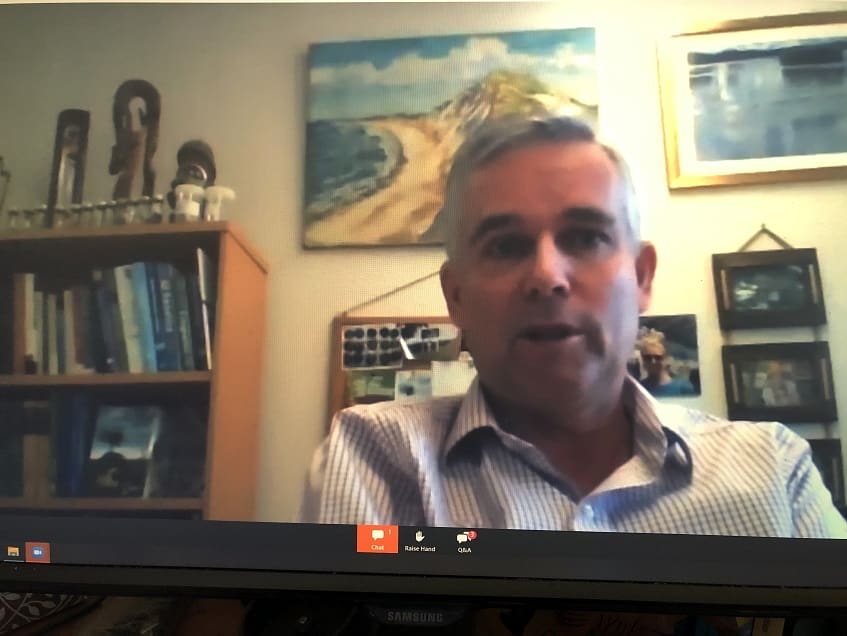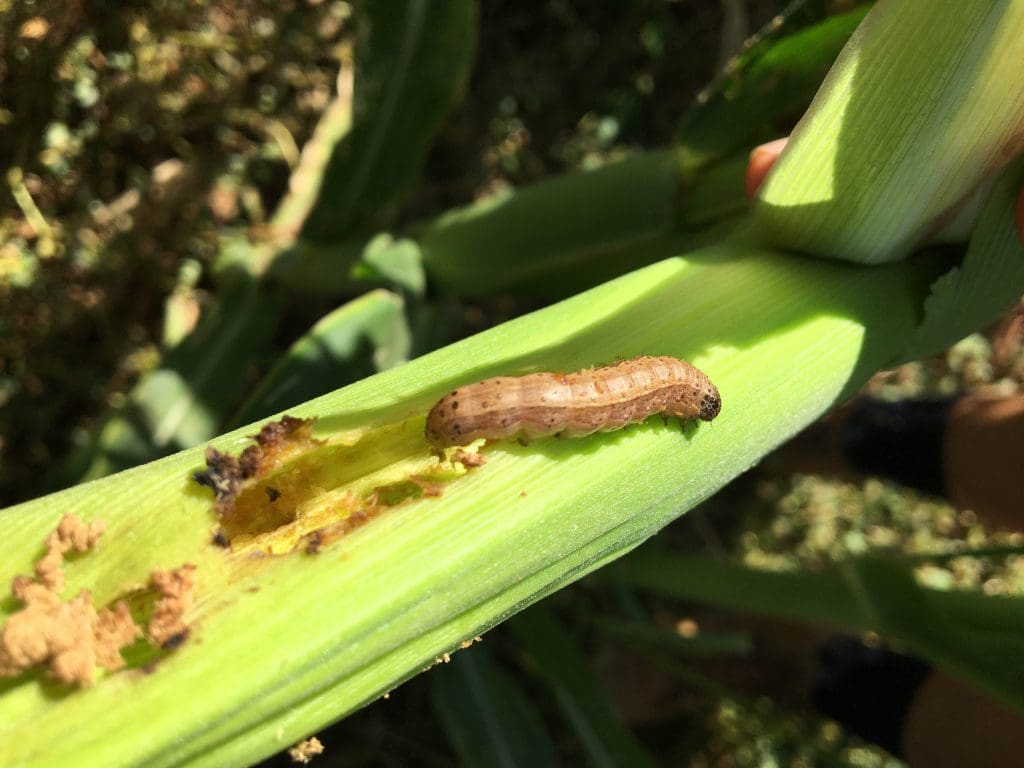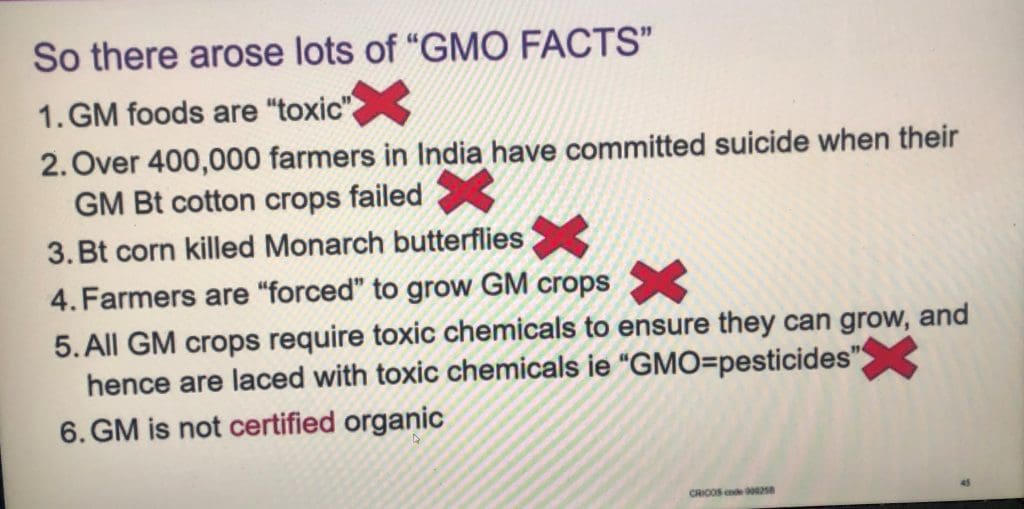CRISPR gene editing technology has the potential to dramatically increase the number of traits that can be introduced into agricultural crops, far quicker and cheaper than genetically modified (GM) technology has been able to achieve, according to Queensland Alliance for Agriculture and Food Innovation (QAAFI) director of crop science, Professor Ian Godwin.
Addressing yesterday’s University of Queensland webinar, ‘Good enough to eat‘, Professor Godwin said only a very small number of GM crops had been approved and adopted in Australian agriculture, but gene editing offered huge potential for a vast array of traits to be made more readily available to Australian growers.
“Because gene edited crops are not going to be regulated, it means there is not going to be a huge cost to get them to the market,” he said.
“The cost of getting them to the market won’t be much higher than any standard plant breeding. That means there will be a lot of diverse traits out there.”
Professor Godwin said the main reason there was such a small number of GM crops and traits available was the high cost of getting them through regulation.
“For example, if we had a GM sorghum that had higher protein and was more digestible, it would cost in the order of US$50 million to get through all the regulation,” he said.
“Hence, most of the GM crops have traits that have already gone through the regulatory process. So (with Bt) and Roundup Ready crops we have gone through the regulation and it is easier to get a new Roundup Ready crop to market.
“That has led to a terribly small handful of GM crops. There are only 10 crops at the moment that have genetically modified versions. I predict that in 10 years’ time there will probably be gene edited versions of 20 to 30 different crop species and there will be many traits within those species.”

QAAFI director of crop science, Professor Ian Godwin, addresses the University of Queensland webinar, ‘Good enough to eat’.
Simple technique
Comparatively, GM technology involves a complex and highly-regulated process of transferring a gene from one organism to another, whereas gene editing involves going inside a cell and changing it from inside, a technique more akin to traditional and natural methods.
Professor Godwin said one of the main attractions of gene editing was that it was a relatively simple technique which opened up new opportunities for plant breeders and seed companies.
“Anyone who can do plant tissue culture and basic transformation can do gene editing,” he said.
“The ultimate in democratisation is that, at the moment the way we do gene editing requires tissue culture, but there are evolving techniques where you can undertake gene editing in the glass house, potentially by spraying the enzyme and RNA onto the plant in such a way it gets into the growing point of the plant.
“If plant scientists can deliver that technology, it means gene editing basically becomes a plant breeding tool available to all plant breeding companies.”
Fall armyworm control
Responding to the question of whether Bt corn would become available to counter the recent incursion into Australia of fall armyworm, Professor Godwin said, again, it was hampered by the high cost of producing and gaining regulatory approval for GM crops.
He said the Australian maize industry was small and the only real option for controlling the pest in maize in the short term was for growers to ramp up their insecticide spraying regimes.
 “In the long term, a genetic solution to resistance to fall armyworm is all we’ve got. Worldwide, no-one has been able to find any source of real resistance within the maize gene pool. The most resistant lines have insecticidal proteins in them, combinations of Bt and other insecticidal proteins which stop the fall armyworm feeding when it is quite small,” he said.
“In the long term, a genetic solution to resistance to fall armyworm is all we’ve got. Worldwide, no-one has been able to find any source of real resistance within the maize gene pool. The most resistant lines have insecticidal proteins in them, combinations of Bt and other insecticidal proteins which stop the fall armyworm feeding when it is quite small,” he said.
“Again, it comes down to money. Is the Australian market big enough for a company to say: “We will take it through the necessary regulatory procedure to market this in Australia”?
“That’s a conversation seed companies are having internally right now. They will make their decision on economic terms.
“The entire maize market in Australia would be too small for even one single maize variety in the United States. In other words, they would need to have a market bigger than the Australian market just to release a single maize variety.”
Non-viable seed production
Responding to concerns that some proprietary GM crops did not produce viable seed, forcing farmers to buy new seed every year, Professor Godwin said there were many myths surrounding the motives of companies applying that constraint.
“It’s a myth that Monsanto developed it and called it Terminator technology. It was actually developed by the United States Department of Agriculture. They never called it Terminator technology, that was the name Greenpeace called it,” he said.
“It wasn’t really about making people buy the seed every year, it was more about ensuring that whatever trait was put into a crop won’t pass on to the next generation because that generation can’t make viable seeds.
“If you can’t regrow the seed it also means there is no escape of the genetic material from those grains.”
Professor Godwin said it was often to the farmer’s advantage to start afresh with quality-assured seed.
“It is not so much the case in subsistence agriculture, but in the Western World where we are trying to produce food as cleanly and efficiently as possible and maximise yield most farmers will buy their seed every year because they know it will be good quality seed that comes with a germination percentage. If it doesn’t come up and establish well they can go back to the company and get their money back. It is really good quality assurance for farmers,” he said.
“If you keep the seed yourself and plant it and it’s only got 30 per cent germination, you are not going to get a crop and you only have yourself to blame because you didn’t have good quality seed to start with.”
Sustainable production
Professor Godwin said there were many examples throughout the world where GM crops had allowed viable, sustainable agricultural production that otherwise wouldn’t have been possible.
“Even though it is publicly cited that no-one in Europe grows GM crops, there is quite a bit of Bt, insect-resistant maize grown in Spain. The reason is that otherwise they wouldn’t be able to grow it because resistance to insecticide is so bad. They are growing insect-resistant crops because they have to,” he said.
“We know that from a productivity and environmental point of view if all jurisdictions in the world had access to the technology farmer profitability would go up, but more importantly sustainability would go up.
“Despite the marketing, things that are calling themselves organic are not the most sustainable because if you have to double the food production area to get the same amount of production, what is the outcome? It means grasslands and forests have to be cleared to turn into agriculture.”

Some of the incorrect ‘facts’ that circulate about GM and drive consumer fears.
Battling consumer fears
Responding to the question of why consumers continued to be wary of GM and gene edited products, Professor Godwin said it was fear driven.
“It comes back to stigmatisation. If you stigmatise something and there is fear, people will avoid it if there is an alternative. In places like Australia where there is plentiful nutritious food, if someone tells us that GM is bad and there is an alternative that doesn’t cost any more we will probably take it.
“In parts of the world like sub-Saharan Africa a lot of farmers are leading the charge to have access to genetically modified and gene edited crop plants because they know it will enable them to have a much higher level of productivity, feed their families and have excess crop production so they can take some to the markets.”



HAVE YOUR SAY